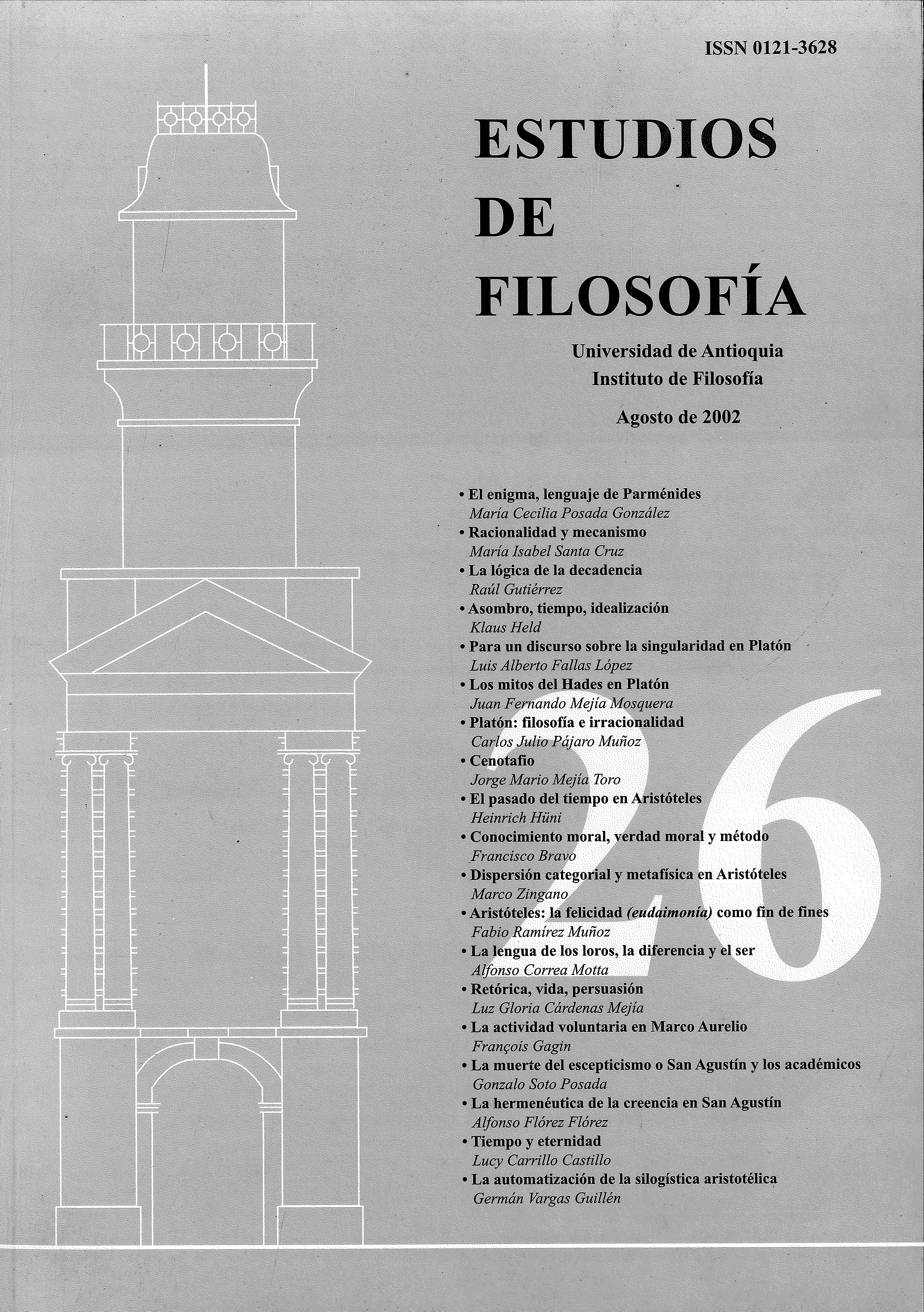Tiempo y eternidad. Sobre los análisis del tiempo en el libro XI de las Confesiones de Agustín
DOI:
https://doi.org/10.17533/udea.ef.14982Palabras clave:
Agustín, tiempo, eternidad, confesionesResumen
No es un sinsentido decir que para el obispo de Hipona como, paro los neoplatónicos, el tiempo es imagen de la eternidad. Pero esa relación tiempo-eternidad tiene para Agustín un significado particular. Agustín busca demostrar en los libros XI a XIII de las Confesiones que el libro del Génesis es el Timeo de los cristianos. A la luz de las primeras líneas del Génesis, últimos libros de las Confesiones tienen por tarea alcanzar una comprensión del origen del universo que haga ver cómo lo eterno obra continuamente sobre lo temporal, de tal modo que Agustín pueda fundar su dogma de la salvación en la relación tiempo-eternidad. Aquí la autora sigue el curso de las reflexiones del libro XI de las Confesiones para señalar al final, tanto la condena agustiniana de lo temporal como la problemática del concepto de eternidad.
Descargas
Descargas
Publicado
Cómo citar
Número
Sección
Categorías
Licencia
Derechos de autor 2002 Lucy Carrillo Castillo

Esta obra está bajo una licencia internacional Creative Commons Atribución-NoComercial-CompartirIgual 4.0.
Los autores que publican en Estudios de Filosofía acuerdan los siguientes términos:
1. El Autor retiene el copyright del "Artículo", por el cual se entiende todos los objetos digitales que pueden resultar de la subsiguiente publicación o distribución electrónica.
2. En conformidad con los términos de este acuerdo, el autor garantizará a Estudios de Filosofía como Editor el derecho de la primera publicación del artículo.
3. El Autor le concederá al Editor un derecho perpetuo y no-exclusivo, así como una licencia de la misma clase, de publicar, archivar y hacer accesible el Artículo parcial o totalmente en todos los medios conocidos o por conocerse, derecho y licencia que se conocen como Creative Commons License Deed. Atribución-No Comercial- Compartir igual CC BY-NC-SA o su equivalente que para efectos de eliminar toda duda, le permite a otros copiar, distribuir, y transmitir el Artículo bajo las siguientes condiciones: (a) Atribución: Se deben reconocer los créditos de la obra de la manera especificada por el Autor a Estudios de Filosofía, pero no de una manera que sugiera que tiene su apoyo o que apoyan el uso que hace de su obra. (b) No Comercial: No se puede utilizar el Artículo para fines comerciales.
4. El Autor puede realizar otros acuerdos contractuales no comerciales para la distribución no exclusiva de la versión publicada del Artículo (v. gr. ponerlo en un repositorio institucional o publicarlo en un libro) con la condición de que haga el debido reconocimiento de su publicación original en Estudios de Filosofía.
5. A los Autores se les permite y Estudios de Filosofía promueve publicar en línea (online) la versión pre-impresa del Artículo en repositorios institucionales o en sus páginas web, antes y durante la publicación, por cuanto que puede producir intercambios académicos productivos, así como una mayor citación del Artículo publicado (ver The Effect of Open Access). Dicha publicación durante el proceso de producción y en la publicación del Artículo se espera que se actualice al momento de salir la versión final, incluyendo una referencia a la URL de Estudios de Filosofía.















